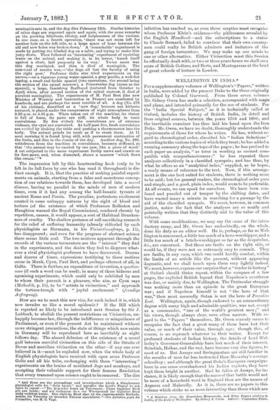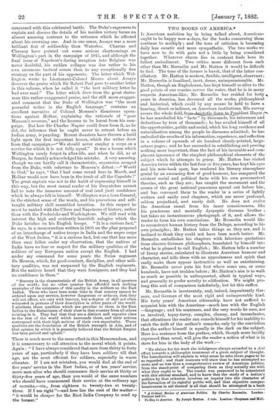WELLINGTON IN INDIA.* FOUR supplementary volumes of Wellington's "Papers," written
in India, were added by the present Duke to the three originally published by Colonel Garwood. From these seven volumes Mr. Sidney Owen has made a selection, accompanied with masis , and plans, and intended primarily for the use of students. For the "India Special Subject," as it is technically called at
Oxford, includes the history of British India,, in detail and * A Selection from the Despatches, Memoranda, and Other Papers relating to India, of the Duke of Wellington. By Sidney J. Owen. Oxford : Clarendon Press..
from original sources, between the, years 1784 and 1806; and the inevitable examiner has thus laid his hand upon the Iron Duke. Mr. Owen, we have no doubt, thoroughly understands the
requirements of those for whom he writes. He has, without re- gard to chronological order, classified his "Indian Selections "
according to the various topics of which they treat; he has added a running summary along the tops of the pages ; he has prefixed to each paper an analysis, "as terse in wording as seemed com- patible with comprehensiveness ;" he has repeated these analyses collectively in a classified synopsis ; and has thus, by what he offers as an "analytical index," supplied, as he hopes, a ready means of reference to the text. Now, if this arrange- ment is the one best suited for students, there is nothing more to be said; but for general readers, the chronological order pure and simple, and a good, plain index, would seem to be preferable. At all events, we can speak for ourselves. We have been con- fused and puzzled out of temper by the shifting dates, and have wasted many a minute in searching for a passage by the aid of the classified synopsis. We must, however, in common justice, notice the fact that the analyses are so neatly and pointedly written that they distinctly add to the value of this volume.
With some modifications, we may say the same of the intro- ductory essay, and Mr. Owen has undoubtedly, on the whole, done his duty as an editor well. He is, perhaps, so far as Wel- lington is concerned, a little too much of a hero-worshipper, and a little too much of a fetich-worshipper so far as the despatches.
are concerned. But these are faults on the right side, or would be, if they were not so extremely easy to commit. They are faults, in any case, which one could hardly combat, within the limits of an article like the present, without appearing dogmatic, and we shall touch upon them very lightly indeed.
We must,however, express our surprise that a "reader in history" at Oxford should thrice repeat, within the compass of a few pages, the exploded British legend that Napoleon's overthrow was due, or mainly due, to Wellington. The Peninsular struggle was nothing more than an episode in the great European war ; and if Napoleon himself is not "the hero of that
war," then most assuredly Satan is not the hero of Paradise Lost. Wellington, again, though endowed to an extraordinary degree with many high and admirable qualities, was not, except as a commander, " -one of the world's greatest men ;" and
his views, though always clear, were often narrow. With re- gard to the " Papers " themselves, Mr. Owen scarcely seems to recognise the fact that a great many of them have lost their value, or much of their value, through age ; though this, of course, is no reproach whatever to their writer. Except for professed students of Indian history, the details of Lord Wel- lesley's Governor-Generalship have lost much of their interest. Scindiah, Holkar, and the rest, have become very dim figures, to most of us. But Assaye and Seiingapatam are still familiar in the months of men far less instructed than Macaulay's average schoolboy ; and although the great Duke's European campaigns have in one sense overshadowed his Indian exploits, they have kept them bright in another. Had he fallen at Assaye, for in- stance, it is likely enough that the name of that battle would not be more of a household word in England than are the names of Arganm and Malavelly. As it is, there are no papers in this volume which strike us as more interesting than those which are concerned with this celebrated battle. The Duke's eagerness to explain and discuss the details of his maiden victory forms an almost amusing contrast to the reticence which he affected about his crowning one. And in one sense, Assaye was a more brilliant feat of soldiership than Waterloo. Charras and Chesney have pointed out some serious shortcomings on Wellington's part in the campaign of 1815, and although the final issue of Napoleon's daring irruption into Belgium was never doubtful, his sudden collapse was due rather to his own enormous tactical errors than to any exceptionally fine strategy on the part of his opponents. The letter which Wel- lington wrote to Lieutenant-Colonel Munro about. Assaye deserves the praise which Sir Robert Peel gave to another letter in this volume, when he called it "the best military letter he had ever read." The letter which drew from the great states- man this rather exaggerated praise, and the still more exagger- ated comment that the Duke of Wellington was "the most powerful writer in the English language," contains an excellent narrative of Colonel Monson's disastrous opera- tions against Holkar, explaining the rationale of "poor Monson's reverses," and the lessons to be learnt from his cam- paign. But how Sir Charles Napier could draw from it, as he did, the inference that he ought never to retreat before an Indian army, is puzzling. Recent disasters have thrown a lurid light upon the first important lesson, which the writer drew from that campaign,—" We should never employ a corps on a service for which it is not fully equal." It was a lesson which Wellington rarely forgot in after-life, and when he did, as at 33urgos, he frankly acknowledged his mistake. A very amusing, though we can hardly call it characteristic, expression escaped from the Duke, with reference to Monson's defeat :—" Would to God," he says, "that I had come round here in March, and Holkar would now have been in the tomb of all the Capulets !" 'The great captain was not in the habit of expressing himself in this way, but the most casual reader of his Despatches cannot fail to note the immense amount of real (and just) confidence which he always felt in himself. Wellington was a born General, in the strictest sense of the words, and his precocious and self- taught military skill resembled intuition. In this respect he must be ranked with the Clives and Napoleons of history, rather than with the Fredericks and Washingtons. We still read with interest the high and evidently heartfelt eulogies which the Duke lavishes on his English troops. "It is a curious fact," he says, in a memorandum written in 1805 on the plan proposed .of an interchange of native troops in India and the negro corps of the West Indies, "it is a curious fact, but one that has more than once fallen under my observation, that the natives of India have no fear or respect for the military qualities of the soldiers of any European nation except the English. I had ender my command for some years the Swiss regiment De Meuron, which, for good-conduct, discipline, and other mili- tary qualities, was not surpassed by the English regiments. But the natives heard that they were foreigners, and they had no confidence in them."
"Bravery is the characteristic of the British Army, in all quarters of the world ; but no other quarter has afforded such striking examples of the existence of this quality in the soldiers as the East Indies. Those who have been some time in that country cannot be ordered upon any service, however dangerous or arduous, that they will not effect, not only with bravery, but a degree of skill not often witnessed in persons of their description in other parts of the world. I attribute those qualities which are peculiar to them in the East Indies to the distinctness of their class in that country from all others existing in it. They feel that they are a distinct and superior class to the rest of the world which surrounds them, and their actions correspond with their high notions of their own superiority. These qualities are the foundation of the British .strength in Asia, and of that opinion by which it is generally believed that the British Empire has been gained and upheld."
There is much more to the same effect in this:Memorandum, and it is unnecessary to call attention to the moral which it points. Again : "I have always considered that men from thirty to forty years of age, particularly if they have been soldiers till that age, are the most efficient for soldiers, especially in warm climates. If I am not mistaken, you would find at the end of
-five years' service in the East Indies, or of ten years' service, more men alive who should commence their service at thirty or
thirty-five years of age, than you would of the same numbers who should have commenced their service at the ordinary age
of recruits,—viz., from eighteen to twenty-two or twenty- three. If I am right "—and here lies the root of the matter— it would be cheaper for the East India Company to send up the former."















































 Previous page
Previous page